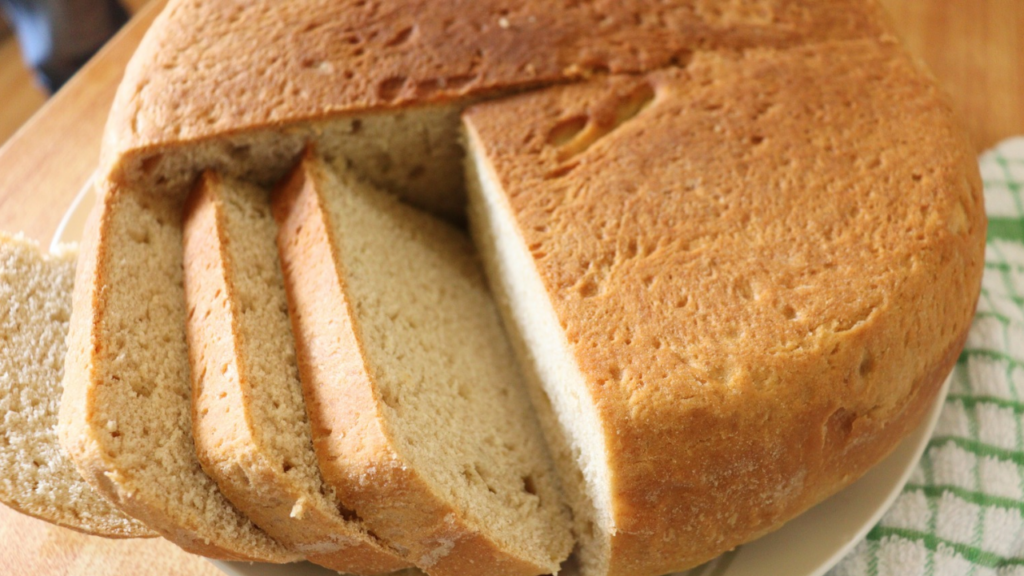Enriched Sourdough Sandwich Bread Without an Oven
Are you looking for a delicious, soft sourdough sandwich bread recipe that doesn’t require an oven?
This pan-baked stovetop sourdough bread is perfect for you!
Whether you have limited baking equipment or simply want an alternative way to bake, this method yields a flavorful, enriched loaf with a tender crumb. Plus, sourdough bread is naturally healthier than conventional bread, making it easier to digest due to the fermentation process.
This step-by-step guide will walk you through making an enriched sourdough sandwich bread using simple ingredients and a standard pan.
Let’s dive into this easy stovetop bread recipe that’s sure to become a staple in your kitchen!
Why Choose Stovetop Sourdough Bread?
- No Oven Required: Perfect for those without an oven or who prefer an energy-efficient method.
- Soft and Fluffy Texture: The addition of eggs, milk, and oil enriches the dough, resulting in a tender crumb.
- Healthier Alternative: Sourdough fermentation makes nutrients more bioavailable and is easier to digest.
- Simple and Accessible: Uses basic ingredients and a standard pan found in every kitchen.
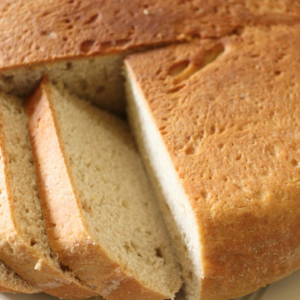
Pan-Baked Stovetop Enriched Sourdough Sandwich Bread (No Oven Needed!)
Equipment
- 1 pan with lid (About 10 inches in diameter)
- 2 mixing bowls
- 1 Wooden Spoon
- measuring spoons and cups as needed
- 1 Clean Kitchen Towel
Ingredients
- 4 cups all-purpose flour
- ¼ cup sugar (adjust to taste)
- 1 tsp. salt
- 1 tsp. baking soda (optional, for reducing sourness)
- 1 cup active sourdough starter
- 1 egg
- 4 tbsps. cooking oil
- 1 cup room temperature milk (may vary slightly)
- 1 tsp. margarine or fat (for greasing)
- A small amount of flour (for dusting)
Instructions
- Prepare the DoughIn a large mixing bowl, whisk together the flour, sugar, salt, and baking soda (if using). In a separate bowl, combine the sourdough starter, cooking oil, egg, and milk. Mix well. Gradually add the dry ingredients to the wet ingredients, stirring with your hands or a spoon.Continue mixing until a soft dough forms. If it’s too stiff, you can add a few drops of milk and mix until well incorporated. Cover the dough with a clean kitchen towel and let it rest for 30 minutes.
- Knead and Bulk Ferment Transfer the dough to a floured surface and knead for about 8-10 minutes until smooth and elastic. Place the dough back into the bowl, lightly oil the surface, and cover. Allow it to bulk ferment for 8 hours at room temperature (or overnight for deeper flavor).
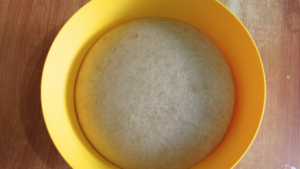
- Shape the Dough After fermentation, punch down the dough and knead it briefly. Shape it into a smooth round or oval shape that fits your pan.
- Prepare Your Pan Grease a heavy-bottomed sufuria or saucepan, or pan with margarine or fat. (If using a pan like I'm doing, ensure it has a lid that will allow for sufficient space for the bread to expand upward while baking)Dust lightly with flour to prevent sticking. Place the shaped dough into the pan, gently spreading it to fit the bottom surface of the pan.
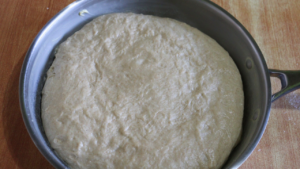
- Stovetop Baking MethodCover the pan with a fitting lid to trap steam and mimic an oven environment.Place the pan over a very low flame: Small burner: Heat on full flame for 30 seconds, then reduce to the lowest setting.Wider burner: Heat on full flame for 20 seconds, then reduce to a very, very low flame as shown below. I do this by reducing the flame as though I’m switching off and I get it to this very low flame. Let the bread bake for 45 minutes to an 1 hour, checking occasionally.
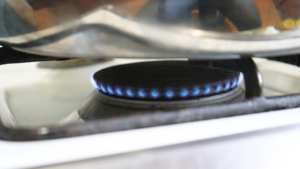
- Check for Doneness Insert a clean, dry knife or toothpick into the center of the bread. If it comes out clean, your bread is fully baked.Also, it will have firmed up on the surface with no raw dough.

- Optional BrowningIf you prefer a browned top like I do, invert the bread into the pan and bake for another 10-12 minutes on the same low heat.
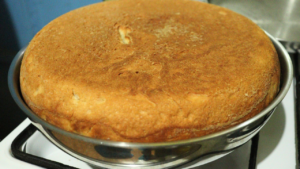
- Cool and Serve Transfer the bread to a cooling rack or plate. Brush with butter or margarine to keep it soft and moist. Allow to cool completely before slicing.
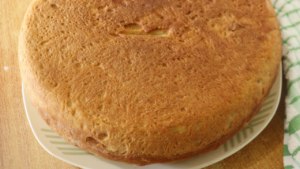
Notes
Expert Tips for the Best Stovetop Sourdough Bread
-
Use an Active Sourdough Starter:
-
Monitor the Heat:
-
Cover the Pan Properly:
-
Bulk Fermentation Time:
-
Store Properly:
Frequently Asked Questions (FAQs)
Can I make this recipe without eggs?
Yes! Substitute the egg with an extra ¼ cup of milk.What type of pan works best?
A heavy-bottomed sufuria, saucepan, non-stick pan, or aluminum pan with a lid works best for even heat distribution.How do I know my sourdough starter is active?
It should be bubbly and doubled in size 4-6 hours after feeding. If unsure, do a “float test” by dropping a spoonful in water—if it floats, it’s ready!Can I bake this in an oven instead?
Yes! Bake at 165°C (330°F) for 30-40 minutes until golden brown and cooked through.My bread is too dense. What went wrong?
- The starter may not have been active enough.
- The dough may not have fermented long enough.
- The flame may have been too high, preventing even cooking.
Serving Suggestions
- Spread with marge, butter, jam, or honey for a classic breakfast.
- Use as sandwich bread for a hearty lunch.
- Serve with soups or stews for a comforting meal.
Final Thoughts
Making stovetop sourdough sandwich bread is a fantastic alternative for those without an oven. With its soft, enriched texture and deep sourdough flavor, this bread is not only easy to make but also a healthier, more digestible option. Try this no-oven sourdough bread recipe today, and let us know how it turns out in the comments! Happy baking! Enhance your hospitality for the glory of God.Recommended:
Easy Sourdough Starter Recipe for a Beginner
How to Ferment Porridge Fast With a Sourdough Starter
Sourdough Drop Scones With Dicard| Breakfast Recipe
Sourdough Mahamri Recipe| Swahili Doughnuts
Fermented Porridge Recipe the Natural Way

